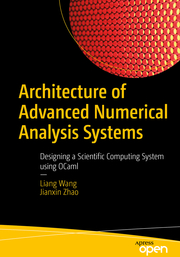Detailansicht
Architecture of Advanced Numerical Analysis Systems
Designing a Scientific Computing System using OCaml
ISBN/EAN: 9781484288528
Umbreit-Nr.: 6544021
Sprache:
Englisch
Umfang: xiii, 472 S., 14 s/w Illustr., 43 farbige Illustr.
Format in cm:
Einband:
kartoniertes Buch
Erschienen am 27.12.2022
Auflage: 1/2023
- Zusatztext
- This unique open access book applies the functional OCaml programming language to numerical or computational weighted data science, engineering, and scientific applications. This book is based on the authors' first-hand experience building and maintaining Owl, an OCaml-based numerical computing library. You'll first learn the various components in a modern numerical computation library. Then, you will learn how these components are designed and built up and how to optimize their performance. After reading and using this book, you'll have the knowledge required to design and build real-world complex systems that effectively leverage the advantages of the OCaml functional programming language. What You Will Learn Optimize core operations based on Ndimensional arrays Design and implement an industrylevel algorithmic differentiation module Implement mathematical optimization, regression, and deep neural network functionalities based on algorithmic differentiation Design and optimize a computation graph module, and understand the benefits it brings to the numerical computing library Accommodate the growing number of hardware accelerators (e.g. GPU, TPU) and execution backends (e.g. web browser, unikernel) of numerical computation Use the Zoo system for efficient scripting, code sharing, service deployment, and composition Design and implement a distributed computing engine to work with a numerical computing library, providing convenient APIs and high performance Who This Book Is For Those with prior programming experience, especially with the OCaml programming language, or with scientific computing experience who may be new to OCaml. Most importantly, it is for those who are eager to understand not only how to use something, but also how it is built up.
- Kurztext
- This unique open access book applies the functional OCaml programming language to numerical or computational weighted data science, engineering, and scientific applications. This book is based on the authors' first-hand experience building and maintaining Owl, an OCaml-based numerical computing library. You'll first learn the various components in a modern numerical computation library. Then, you will learn how these components are designed and built up and how to optimize their performance. After reading and using this book, you'll have the knowledge required to design and build real-world complex systems that effectively leverage the advantages of the OCaml functional programming language.You will: Optimize core operations based on Ndimensional arrays Design and implement an industrylevel algorithmic differentiation module Implement mathematical optimization, regression, and deep neural network functionalities based on algorithmic differentiation Design and optimize a computation graph module, and understand the benefits it brings to the numerical computing library Accommodate the growing number of hardware accelerators (e.g. GPU, TPU) and execution backends (e.g. web browser, unikernel) of numerical computation Use the Zoo system for efficient scripting, code sharing, service deployment, and composition Design and implement a distributed computing engine to work with a numerical computing library, providing convenient APIs and high performance
- Autorenportrait
- Liang Wang is the Chief AI Architect at Nokia, the Chief Scientific Officer at iKVA, a Senior Researcher at the University of Cambridge, and an Intel Software Innovator. He has a broad research interest in artificial intelligence, machine learning, operating systems, computer networks, optimization theory, and graph theory. Jianxin Zhao is a PhD graduate from the University of Cambridge, supervised by Prof. Jon Crowcroft. His research interests include numerical computation, high-performance computing, machine learning, and their application in the real world.
